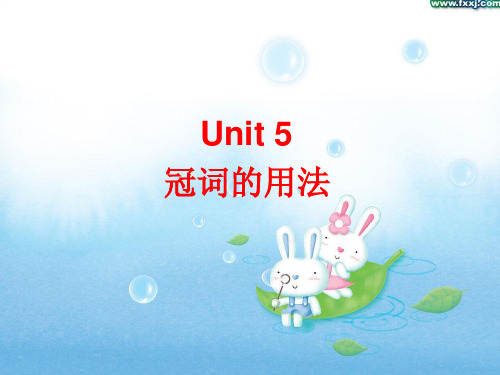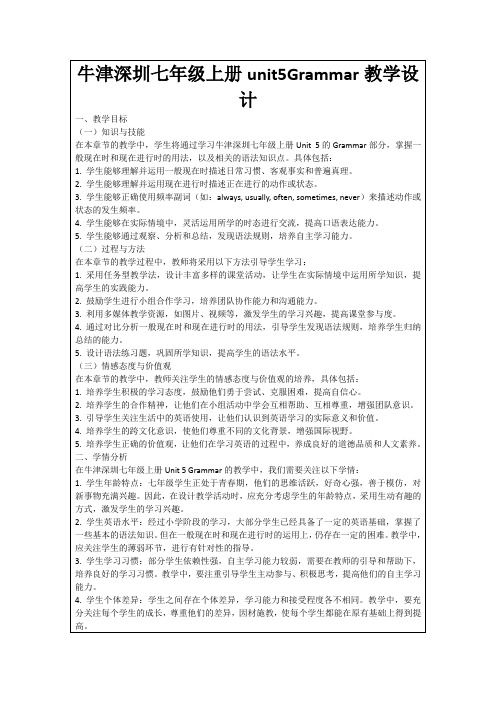U5 Grammar 1
牛津译林版英语八年级下册U5 Grammar 教案

《英语》(八年级下册)Unit 5 Good mannersGrammarI. Teaching aims and learning objectivesBy the end of the lesson, students should be able to:1. use “to be + adjective + enough + to-infinitive” to describe a person’s personality and abilities;2. use “to be + too + adjective + to –infinitive” to express a negative result.II. Teaching contents1. New words and phrases: discussion, express, make everyone laugh, on her own, join thediscussion, express himself clearly, all the main points, be busy with 2. New structures: You are old enough to learn about manners.British people are too polite to shout loudly in public.The UK is too far away for Jenny to go there on her own.III. Focus of the lesson and predicted area of difficultyLearn to use “to be + adjective + enough + to-infinitive” to describe a person’s personality and abilities.Learn to use “to be + too + adjective + to–infinitive” to express a negative result.IV. Teaching proceduresA Using enough toStep 1 Lead-inFree talkT: How do British people behave in public?S: They’re polite enough to obey traffic rules.They’re patient enough to wait till others move.In the underground they’re kind enough to give up their seats for pregnant women, elderly people or women with children.【设计意图:通过谈论英国人的礼貌行为,导入第一个语法点enough to的用法。
初中英语九年级上册(牛津译林版)Unit5Grammar教学设计

4.通过小组讨论、角色扮演等活动,提高学生的英语口语表达能力和听力理解能力,使他们在真实的语言环境中能够熟练运用所学知识进行交流。
(二)过程与方法
1.采用任务型教学法,让学生在完成具体任务的过程中,自主探究、合作学习,培养他们发现问题、解决问题的能力。
4.结合本章节的内容,教育学生关爱家人、朋友,珍惜与他们共度的时光,树立正确的人生价值观。
二、学情分析
九年级的学生已经具备了一定的英语基础,他们对英语语法知识有了一定的了解和掌握,但在实际运用中仍存在一些困难。特别是对于时态的运用,学生容易混淆,需要进一步巩固和练习。在本章节的学习中,学生将通过具体的语境,深入理解和运用一般过去时、现在完成时和过去进行时。此外,学生在团队合作和口语表达方面有待提高,需要教师在教学过程中给予关注和指导。针对学生的实际情况,本章节的教学应注重以下方面:
(三)情感态度与价值观
1.培养学生热爱英语学习的情感,激发他们学习英语的兴趣和自信心,使他们在学习过程中始终保持积极的态度。
2.通过学习英语,帮助学生拓宽国际视野,了解不同文化背景下的生活习俗,培养他们的跨文化交际意识。
3.在课堂教学中,注重培养学生的团队合作精神,让他们学会相互尊重、相互帮助,提高人际交往能力。
五、作业布置
为了巩固本节课所学的一般过去时、现在完成时和过去进行时的语法知识,以及提高学生的实际应用能力,特布置以下作业:
1.书面作业:
a.完成教材Unit 5 Grammar部分的练习题,包括填空、选择、改写句子等,要求学生在规定时间内独立完成。
b.结合自己的周末生活,用一般过去时、现在完成时和过去进行时各写一段话,描述自己做过的事情,字数不少于100字。
必修5unit1 grammar

The past participle as attribute & predicative
1. 过去分词知多少
1. 2. 3. 4. 5. 6. 7. 惊恐的人们 预留的座位 被污染的水 拥挤的教室 打碎的花瓶 关了的门 疲惫的观众 1. 2. 3. 4. 5. 6. 7. terrified /astonished people reserved seats polluted water a crowded room a broken vase a closed door the tired audience
该题考查分词作表语的用法。 该题考查分词作表语的用法。“to
pay sb. by the hour” 计时给某人报酬。 计时给某人报酬。 此题被动结构作表语。类似的有: 此题被动结构作表语。类似的有:get burnt, get hurt , get wounded.
• What he has done is really ____.Now his C parents are _____ him. A. disappointing; B. disappointing; C. disappointing; D. disappointed; disappointed at disappointed about disappointed with disappointing by
过去分词做定语:表被动,表完成。 ①过去分词做定语:表被动,表完成。 现在分词作定语:表主动, ②现在分词作定语:表主动,表进行。 将要发生的动作 不定式作定语:表示将要发生的动作。 ③不定式作定语:表示将要发生的动作。
区别 2
Falling leaves Fallen leaves
外研版高中英语必修5 Module1 Grammar精品课件

训 练
·
·
突 破
2. 表示现在的状态或情况。如句 ③。
达 标
3. 表示一个按规定、计划、安排要发生的动作, 这类词有: go, come, arrive, leave, start, begin等。如句②。
语 4. 表示客观事实、科学真理、格言等。如句 ④。
课
法
堂
探 5. 在时间状语从句或条件状语从句中, 用一般现在时表示将来。 训
4. be about to表示“立即的将来”, 该句型很少与表示将来的
语 法
具体时间连用, 但可以和when引导的状语从句连用。如句④。
课 堂
探
训
究 ·
5. come, go, leave, arrive, start等词也可以用一般现在时和现
练 ·
突 破
在进行时表示将来。如句⑤。
达 标
语 法 探
语
课
法
探 ①We will go to the park if it doesn’t rain tomorrow.
堂 训
究
练
· 突
②The shop opens at 7: 30 am, and closes at 9: 30 pm.
· 达
破
标
③Her sister is busy at the moment.
语
法
探
究 A. made
·
突 破
C. makes
[2011全国卷Ⅰ] 课
堂
训
B. is making
练
·
D. has made
达 标
【解析】选C。考查一般现在时的用法。句意: 提前这么早计 划是没有意义的——有很多事情在明年会发生变化。用一般 现在时表示现在的情况。
语文出版社 基础模块英语上册 unit 5 grammar

• I bought one computer.
• 我买了一台电脑。 (不是两台) • 2). 表示数量对比时,要用one, 不用a(an)。 • 我有一支红铅笔,但是她有三支。 • I have one red pencil, but she has three. (正)
• 2. a/an+单数可数名词:表示一类人 或物,指同类中的 任何一个,a或an 不必翻译
• 这辆小汽车以每小时100英里的速度行驶。
• 7. 用于某些结构中 • 结构:such a/an+adj.+单数可数名词 quite a/ an +adj.+单数可数名词
rather a/an+adj+单数可数名词
• It is such a fine day.
• 多么晴朗的一天。
• He is quite an honest man.
这堵墙非常高,我们爬不上去。
• How beautiful a bird is!
这是一只多漂亮的鸟啊! • It is too wide a river for me to swim across. 这条河太宽,我游不过去。
• 9. 用于某惯用短语
• have a cold 患感冒 have a rest 休息一下 have a fever 发烧 have a toothache 牙痛 have a talk 谈话 go for a walk 散步 take a bath 洗澡 tell a lie 撒谎 wait a moment 等一会儿 with an effort 努力地 as a result 因此 for a while 一会儿
• 2. 表示双方都知道的或心中明白的人 或物
9a_unit_5__grammar_(1)__牛津英语9a_第五单元_语法

For the later action, we use ___________________ the Simple Past tense.
Kitty and her classmates went to see a film named ‘My Fair Lady’. But they were late. She is running out of breath.
10th December Today, I watched “Roman Holiday” with my friends.Kitty was the first one to arrive at the arrived cinema. When Millie and I ______ (arrive), Kitty had bought ___________(buy) the tickets already. Simon and Daniel came next. Before Simon and Daniel came had gone ________ (come), Millie and I _________ (go) to get some drinks.Then,all five of us waited for arrived Amy outside the cinema. Before Amy ______ had finished (arrive), we ____________(finish ) our drinks. When we __________ (enter) the cinema, the film entered started ______ already _________(start). Luckily, we did had not miss much. (part A3,P.88)
牛津深圳七年级上册unit5Grammar教学设计

4.教师在批改作业时,要关注学生的语法错误,及时给出反馈,帮助学生改正错误,提高语法水平。
5.定期对学生的作业进行检查和评价,鼓励优秀学生,关注学困生,促进全体学生共同进步。
-关注学困生,给予个别辅导,提高他们的学习信心。
5.课后巩固,拓展延伸:
-布置适量的课后作业,巩固所学知识,提高学生的语法能力。
-推荐相关的英语学习资源,鼓励学生在课后进行拓展学习,提高自主学习能力。
6.情感教育,培养价值观:
-在教学过程中,关注学生的情感变化,营造轻松愉快的学习氛围。
-结合教学内容,进行情感教育,培养学生正确的价值观和道德品质。
三、教学重难点和教学设想
(一)教学重难点
1.教学重点:
-掌握一般现在时和现在进行时的用法。
-能够在实际情境中正确运用所学的时态进行交流。
-学会使用频率副词描述动作或状态的发生频率。
2.教学难点:
-区分一般现在时和现在进行时的用法,避免混淆。
-在口语表达中,能够灵活运用所学时态,做到自然流畅。
-对语法规则的归纳总结,形成系统性的知识结构。
4.培养学生的跨文化意识,使他们尊重不同的文化背景,增强国际视野。
5.培养学生正确的价值观,让他们在学习英语的过程中,养成良好的道德品质和人文素养。
二、学情分析
在牛津深圳七年级上册Unit 5 Grammar的教学中,我们需要关注以下学情:
1.学生年龄特点:七年级学生正处于青春期,他们的思维活跃,好奇心强,善于模仿,对新事物充满兴趣。因此,在设计教学活动时,应充分考虑学生的年龄特点,采用生动有趣的方式,激发学生的学习兴趣。
8B Unit5 Grammar1 课件(共31张PPT)

5. Have you _e_v_e__r _ ridden a horse? ( ever, for,
yet)
二、现在完成时的构成
1. 现在完成时的肯定句
主语(第一、二人称单、复数)+have
主语(第三人称复数)
+have
主语(第三人称单数)
+has
+过去分词
e.g. I have finished my report.
2. You have studied in Yanqiao Middle School since 2012. You studied in Yanqiao Middle School two years ago/in 2012. So we can say you have studied in Yanqiao Middle School for two years.
give
gave
given
see
saw
seen
make made
made
put
put
put
come came come
write
wrote written
注:不规则动词见书上122art A)
1. borrow b__o_rr_o_w__e_d 7. send __s_e_n_t______ 2. hope ___h_o_p_e_d____8. watch _w__a_tc_h_e_d__ 3. make ___m_a_d_e____ 9. say ___s_a_id______ 4. get ____g_o_t_____ 10. grow __g_ro_w__n___ 5. plan __p_l_a_n_n_e_d___ 11. hit _____h_it______ 6. cry ___c_r_ie_d_____ 12. enjoy __e_n_j_o_y_ed__
人教版必修一unit5grammar

There was a time. The businessman lost heart at that time. There was a time when the businessman lost heart.
关系副词when
when引导的定语从句修饰表示时间的名 词,并在定语从句中作时间状语,相当于 “介词+关系代词(which)”。 I’ll never forget the day when I joined the league.
=
关系副词why
There are many reasons why people like traveling. for the reasons =why
The relative adverb (关系副词) when(=at /at which)
why → that / which 或去掉why
7. The girl got herself into a situation that she was likely to lose control of her car.
that → where 8. A modern city has been set up in the place where was a wasteland two years ago.
when → that / which或去掉when
3. The village which he was born has taken on a new look.
which前加in 或which → where
4. This is the town where we paid a visit to last year. where → that / which或去掉where
Unit 5 Grammar

4. Please tell her _t_o_c_o_m__e_ here on time . (come/to come)
5. I’ll help you (_t_o_)_s_o_l_v_e_this problem. (to solve/solve )
(1)我不知道接下来该做什么。 I don’t know__w_h_a_t _to_d_o____ next.
(2)她不能决定买哪本书。 She can’t decide_w__hi_c_h_b_o_o_k_t_o_b_u_y___. =She can’t decide which book she should buy.
Exercise
1. It is necessary __f_o_r__ us to learn to wait.
(of/for)
2. It was careless __o_f___ me to break the cup .
(of/for)
3. It took them 1000 yuan __t_o__b_u_y__ this
他跑得足够快,以至于赶上了公交车。
only to do sth. 与 only doing sth.
3. Adverbial of result结果状语
too + adj./adv. +to do sth. adj./adv. enough to do sth.
You are too young to do this job.
你太年轻,以至于不能做这份工作。
He ran fast enough to catch the bus.
牛津9A英语《 Unit5 Grammar》PPT教案课件

I had learned 1000 English words till then.
一、过去完成时的概念与结构特点
过去完成时表示在过去某一时间或动作
之前已经发生或完成了的动作,
即“过去的过去( past-in-tБайду номын сангаасe-
3.一般疑问句:Had +主语+v-ed+其他?
4.特殊疑问句:特殊疑问词+had+主语+ v-ed ?
1.They had already had breakfast before they arrived at the hotel.
2.By nine o’clock yesterday evening he hadn’t got home. 3.--Had you known anything about our school before you came here?
“他们没见面”是到“昨天”为止的(而不是到现 在为止),是过去的过去,故后一个句子需使 用过去完成时态进行表达。
5.李梅很高兴,因为她期中考试及格了。
a. Li Mei was very glad, because she passed the mid-term exam.
b. Li Mei was very glad, because she had passed the mid-term exam.
Where did you study before you came here?
After he closed the door, he left the classroom.
精选 Unit5 Grammar 精品完整教学课件PPT

continue
3 There wa ver itte time The mae-uinute It eemed ie hour to me
___A__t_h_o_u_g__h_/T__h_o_u__g_h__th_e_r_e__w__a_v__e_r_i_tt_e__ti_m__e_,_t_h_e__m_ae-u ___a_r_t_i_t _d_i_d_h__e_r_o_b__w__e___________________________
difficut/eno ating a _A_t_ho_u_g_h_/T_h_o_u_g_h_i_t i_d_i_ff_ic_u_t,_h_e_ __e_n_o_a_ti_n_g_______________ b _h_e_e_n_o_a_ti_n_g______________ __a_th_o_u_g_h_/t_h_ou_g_h_i_t _i _di_ff_ic_u_t___
ver od/go wimming ever da a _A_t_h_ou_g_h_/_Th_o_u_g_h_h_e_i_v_e_r_o_d,_h_e_____ __g_o_e_w_i_m_m_i_n_g_e_ve_r_d_a___________ b _H_e__go_e__w_im_m__in_g_e_v_e_r _da__________ __a_t_ho_u_g_h_/t_h_o_ug_h__he__i v_e_r_o_d_______
- 1、下载文档前请自行甄别文档内容的完整性,平台不提供额外的编辑、内容补充、找答案等附加服务。
- 2、"仅部分预览"的文档,不可在线预览部分如存在完整性等问题,可反馈申请退款(可完整预览的文档不适用该条件!)。
- 3、如文档侵犯您的权益,请联系客服反馈,我们会尽快为您处理(人工客服工作时间:9:00-18:30)。
(1)When(he was)still a boy of 10, he had to work
day and night. (2)She tried her best though (she was) rather poor in health. (3)While (you are) cycling,(you)don’t forget the traffic lights. 骑车时,不要忘记看红绿灯。
④连词(when, if ,even if, unless, once, until, than, as)+过去分词
⑤连词(as if, as though)+不定式 He opened his mouth as if (he were ) to speak.
其他省略
3、连词if在部分虚拟条件句中可省略,但后面的 语序有变化。
• 3. 被省略的部分一般可以在句子中补上, 但有时省略结构已经定型,如果把省略部分 补上,反而不合乎习惯。 • He is taller than I am. 他比我高。 (am之后省略tall,补上不合习惯) • No parking. 禁止停车。(告示用语 = No parking is allowed here.) • 有一些习惯表达很难补上所省略的部分: • Not at all. 不用谢。 • No matter. 不要紧。 • Thanks. 谢谢。
1.---Does your brother intend to study German? B. ---Yes, he intends______. A/ B.to C.so D.that
2. The boy wanted to ride his bicycle in the A. street, but his mother told him ________. A. not to B. not to do C. not do it D. do not to
(1) Had they time, they would certainly come If I had and help us.
(2) Were I you, I would do the work better
If I were you
(3)Should there be a flood, what should we do?
主从复合句中的省略
省略一个从句或从句的一部分,可用so 或 not代替。常 用于此类的动词有believe , think, expect, guess, hope, imagine, suppose, say, tell等以及appear, seem, afraid etc.
(1) –Is he coming back tonight? --I think so (2) –She must be busy now? --If so, she can’t
If there should be a flood,
Notes
• 1. 省略句可同时省掉句子几个成份 • What exciting news! (= What exciting news it is!) 多么令人激动 的消息啊! • Pity he’s failed. (= It is a pity that he’s failed.) 很遗憾,他失败了。 • I like him more than her. (= I like him more than I like her.) • 我喜欢他更甚于喜欢她。
4. He was a lover of sports as he had been a lover of sports in his youth. 5. The river was deep and the ice was thin.
6. You Take care! t
1. 省略句的定义
省略是为了避免重复、突出新信息并使上 下文紧密连接的一种语法修辞手段。省略 在语言中,尤其在对话中,是一种十分普 遍的现象。
Exercise
1. I Haven’t seen you for ages. 2. It Sounds like a good idea. 3. I am Sorry to hear that. 4. walk this way, please! 5. Would you like Joining us for a walk? 6. Would you like Some more tea? 7. It Doesn’t matter. 8. It is a Pity you couldn’t come. 9. What/Such Terrible weather! 10. Are you Going to the supermarket?
(2) 在定语从句中,that在从句中作宾语时可省略.另外,凡 是被动语态的定语从句都可省略关系代词和be 动词。
He likes the songs (that) Andy Lau sings.
He likes the songs (that are) sung by Andy Lau.
其他省略
(go there). (1) –Are you going there?--Yes, I’d like to
(2) He didn’t give me the chance, though he had promised to (give me the chance).
to be
(3) –Are you an engineer? want .
• 2. 英语中有一些固定的省略结构: • a) 在以if, when, though, as if(好象) 等连词引导的从句中,如从句中的主要动词 是be ,常将主语it 和动词be 省略。 • If it is necessary, we shall send a telegram home. 如有必要,我们就往家 里打电报。 it is • Whenever it is possible, he will come to my help. 他一有可能就来帮助我。
. go with us.
(3) –Is she feeling better today? --I’m afraid not.
(4) –Do you think he will attend the meeting? --I guess not.
简单句中的省略
4、省略作宾语的不定式短语,只保留to,但如果 该宾语是动词be或完成时态,则须在之后加上be 或have:
exercise
1.She can swim under water longer than I can swim under water. 1.They discussed whether they should stay in the house or they should try the open air. 3.They had a meal, they went out for a walk and then they came back to sleep. 4. Don’t bathe if you don’t to bathe. 5.I don’t visit my parents as much as I ought to visit my parents.
②连词(though, whether, when)+形容词 Work hard when (you are) young ,or you’ll regret. ③连词(when, while, though)+现在分词 While (I was) walking along the street, I heard my name called.
如果不定式中含有be,have,have been,通常保留be,have,和 have been 。如:
--He hasn’t finished yet. --Well,he ought to have.
其他省略
1、连词的that省略
(1)宾语从句中常省略连词that.
I know thathe is a student.
Unit 5
GRAMMAR
ELLIPSIS (省略)
读下列句子,说你的感觉。
1. This radio works well , but that one doesn’t work well . 2. When water is pure, water is a colorless liquid. 3. Are you ready ? Yes, I am ready .
7. One of the sides of the board should be painted yellow, and________. A. the other is white B. another white C. C the other white D. another is white
3. --What do you think made Mary so upset? C. --________her new bicycle. A. As she lost B. Lost C. Losing D. Because of losing
D. 4.If_____,we’ll continue our experiment after office hours. A.being necessary B.be necessary C.is necessary D.necessary 5.--- Do you think it's going to rain over the weekend? D. --- ________. A. I don't believe B. I don't believe it C. I believe not so D. I believe not 6. Generally speaking, ________according to B. directions, the drug has no side effect. A. when taking B. when taken C. when to take D. when to be taken
